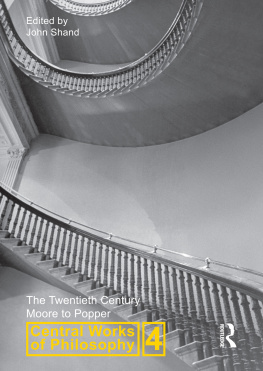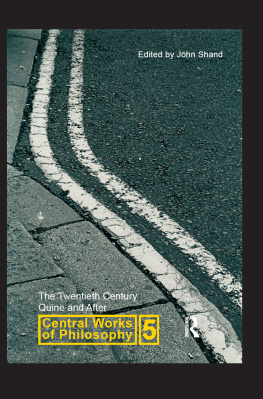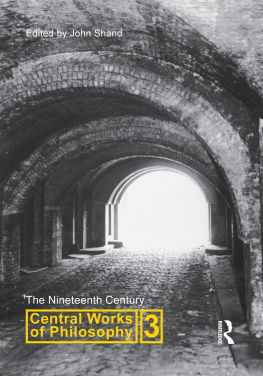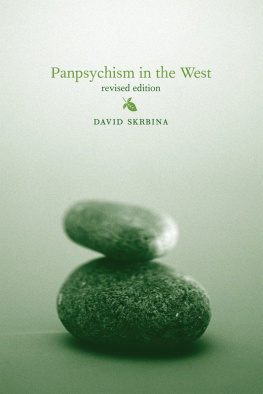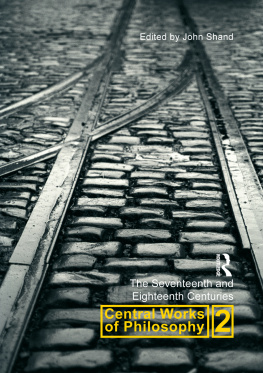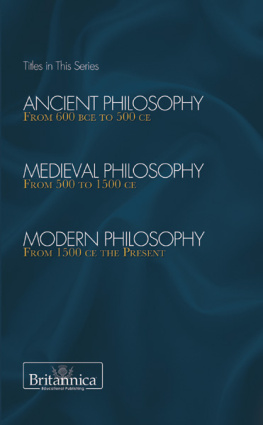Shand - Central Works of Philosophy v1
Here you can read online Shand - Central Works of Philosophy v1 full text of the book (entire story) in english for free. Download pdf and epub, get meaning, cover and reviews about this ebook. City: Chesham, year: 2005, publisher: Taylor and Francis;Acumen, genre: Religion. Description of the work, (preface) as well as reviews are available. Best literature library LitArk.com created for fans of good reading and offers a wide selection of genres:
Romance novel
Science fiction
Adventure
Detective
Science
History
Home and family
Prose
Art
Politics
Computer
Non-fiction
Religion
Business
Children
Humor
Choose a favorite category and find really read worthwhile books. Enjoy immersion in the world of imagination, feel the emotions of the characters or learn something new for yourself, make an fascinating discovery.
Central Works of Philosophy v1: summary, description and annotation
We offer to read an annotation, description, summary or preface (depends on what the author of the book "Central Works of Philosophy v1" wrote himself). If you haven't found the necessary information about the book — write in the comments, we will try to find it.
Shand: author's other books
Who wrote Central Works of Philosophy v1? Find out the surname, the name of the author of the book and a list of all author's works by series.
Central Works of Philosophy v1 — read online for free the complete book (whole text) full work
Below is the text of the book, divided by pages. System saving the place of the last page read, allows you to conveniently read the book "Central Works of Philosophy v1" online for free, without having to search again every time where you left off. Put a bookmark, and you can go to the page where you finished reading at any time.
Font size:
Interval:
Bookmark:

Central Works of Philosophy is a multi-volume set of essays on the core texts of the Western philosophical tradition. From Plato's Republic to the present day, the volumes range over 2,500 years of philosophical writing covering the best, most representative, and most influential work of some of our greatest philosophers. Each essay has been specially commissioned and provides an overview of the work and clear and authoritative exposition of its central ideas. Together these essays introduce the masterpieces of the Western philosophical canon and provide an unrivalled companion for reading and studying philosophy.
Central Works of Philosophy
Edited by John Shand
Volume 1: Ancient and Medieval
Volume 2: The Seventeenth and Eighteenth Centuries
Volume 3: The Nineteenth Century
Volume 4: The Twentieth Century: Moore to Popper
Volume 5: The Twentieth Century: Quine and After
Ancient and Medieval
Edited by John Shand

In memory of my parents , Alexander Hesketh Shand and Muriel Olive Shand
First published in 2005 by Acumen
Published 2014 by Routledge
2 Park Square, Milton Park, Abingdon, Oxon OX14 4RN
711 Third Avenue, New York, NY 10017, USA
Routledge is an imprint of the Taylor & Francis Group, an informa business
Editorial matter and selection, 2005 John Shand. Individual contributions, the contributors.
This book is copyright under the Berne Convention.
No reproduction without permission.
All rights reserved. No part of this book may be reprinted or reproduced or utilised in any form or by any electronic, mechanical, or other means, now known or hereafter invented, including photocopying and recording, or in any information storage or retrieval system, without permission in writing from the publishers.
Notices
Practitioners and researchers must always rely on their own experience and knowledge in evaluating and using any information, methods, compounds, or experiments described herein. In using such information or methods they should be mindful of their own safety and the safety of others, including parties for whom they have a professional responsibility.
To the fullest extent of the law, neither the Publisher nor the authors, contributors, or editors, assume any liability for any injury and/or damage to persons or property as a matter of products liability, negligence or otherwise, or from any use or operation of any methods, products, instructions, or ideas contained in the material herein.
ISBN 13: 978-1-84465-012-5 (hbk)
ISBN 13: 978-1-84465-013-2(pbk)
British Library Cataloguing-in-Publication Data
A catalogue record for this book is available from the British Library.
Designed and typeset by Kate Williams, Swansea.
| John Shand |
| Hugh H. Benson |
| Paula Gottlieb |
| Harry Lesser |
| R. J. Hankinson |
| Stephen R. L. Clark |
| Christopher Kirwan |
| John Marenbon |
| Paul O'Grady |
| Richard Cross |
| Peter King |
Hugh H. Benson is Professor of Philosophy at the University of Oklahoma. He was educated at Oberlin College, Ohio and the University of Michigan, and has published articles on both Plato and Aristotle. He is author of Socratic Wisdom and editor of Essays on the Philosophy of Socrates.
Stephen R. L. Clark is Professor of Philosophy at the University of Liverpool. His books include Aristotle's Man and From Athens to Jerusalem. He is currently working on Plotinus's use of metaphors as spiritual exercises.
Richard Cross is Tutorial Fellow in Theology at Oriel College, Oxford. He has written extensively on medieval theology and metaphysics. Among his recent publications is The Metaphysics of the Incarnation: Thomas Aquinas toDuns Scotus.
Paula Gottlieb is Professor of Philosophy and Affiliate Professor of Classics at the University of Wisconsin-Madison. She recently completed an analysis of Nicomachean Ethics I and II for Project Archelogos and is completing a book, The Virtue in Aristotle's Ethics.
R. J. Hankinson is Professor of Philosophy and Classics at the University of Texas, Austin. He is the author of more than fifty articles on various aspects of ancient philosophy and science. His books include The Sceptics and Cause and Explanation in Ancient Greek Thought.
Peter King is Professor of Philosophy and of Medieval Studies at the University of Toronto. He has published translations of works of Augustine and Buridan, and is the author of many specialized studies in medieval philosophy He is best known for his work on medieval logic and metaphysics.
Christopher Kirwan is Emeritus Fellow and Lecturer in Philosophy at Exeter College, Oxford. His publications include Aristotle: Metaphysics Gamma, Delta and Epsilon and Augustine.
Harry Lesser is Senior Lecturer in Philosophy at the University of Manchester, where his teaching has regularly included courses in ancient philosophy He is the author of a number of articles in ancient philosophy and ethics.
John Marenbon is a Fellow of Trinity College, Cambridge, where he teaches the history of philosophy. His recent publications include Aristotelian Logic, Platonism, and the Context of Early Medieval Philosophy in the West and Boethius.
Paul O'Grady is Lecturer in Philosophy and Fellow of Trinity College Dublin. He previously taught at St Catherine's College, Oxford. He has published papers in epistemology and philosophy of religion and is the author of Relativism (Acumen).
John Shand studied philosophy at the University of Manchester and King's College, Cambridge. He is an Associate Lecturer in Philosophy at the Open University and is the author of Arguing Well and Philosophy and Philosophers: An Introduction to Western Philosophy (Acumen).
The works in the Central Works of Philosophy volumes have been chosen because of their fundamental importance in the history of philosophy and for the development of human thought. Other works might have been chosen; however, the underlying idea is that if any works should be chosen, then these certainly should be. In the cases where the work is a philosopher's magnum opus the essay on it gives an excellent overview of the philosopher's thought.
by Hugh Benson presents the central theme of Plato's Republic , that of the nature of justice. The Republic stands as arguably the most important work of Western philosophy. It is a pivotal work in Plato's thought, presenting a well worked out culmination of previous ideas, following which he subjected those ideas to considerable critical analysis, although he did not abandon them.
by Paula Gottlieb discusses Aristotle's Nichomachean Ethics, central to understanding the key Greek idea in ethics of eudaimonia, usually translated "happiness". However, happiness here refers not to a subjective state of pleasure, but to aret or virtue, whereby our actions should be guided by what truly contributes to our well-being or excellence as the kind of creatures that we are.
release men from superstition and fear of death simply by showing them that there is nothing of which to be afraid.
by R. J. Hankinson explores in Sextus Empiricus's Outlines of Pyrrhonism the arguments for Pyrrhonian scepticism. This is deeply influential on those later philosophers for whom the function of scepticism is not as a test to establish knowledge on an unshakeable foundation, but rather to show that we should suspend judgement and cease the futile search for knowledge.
Font size:
Interval:
Bookmark:
Similar books «Central Works of Philosophy v1»
Look at similar books to Central Works of Philosophy v1. We have selected literature similar in name and meaning in the hope of providing readers with more options to find new, interesting, not yet read works.
Discussion, reviews of the book Central Works of Philosophy v1 and just readers' own opinions. Leave your comments, write what you think about the work, its meaning or the main characters. Specify what exactly you liked and what you didn't like, and why you think so.


